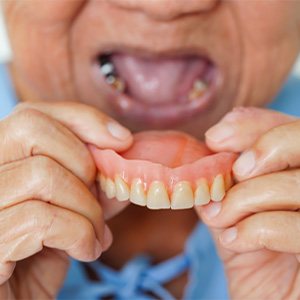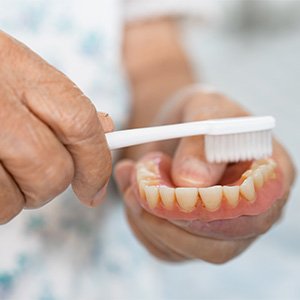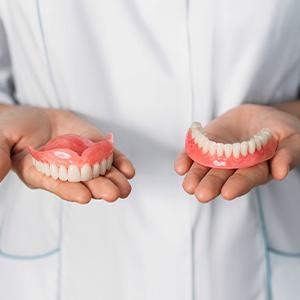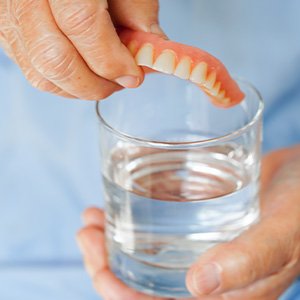Dentures – Carrolton, TX
A Tried-and-True Fix for Tooth Loss

If you suffer from tooth loss, you know how awful the issue is. Lacking even a few teeth makes many everyday tasks – eating, speaking, etc. – much harder. Plus, this condition does long-term damage to your health and quality of life. The good news is that you can always trust dentures in Carrolton to restore your grin! At Flower Dental, these traditional tooth replacements can make your smile whole and lifelike. Learn more about them by reading below or book a consultation soon!
Who’s a Good Candidate for Dentures?

Whether they’ve lost one tooth or many, nearly any adult can get dentures. You’ll just need to consult Dr. Jordan first to ensure everything is in order. When you meet him, he’ll closely assess your mouth and see if dentures meet your smile’s needs. You also don’t need to worry if you don’t qualify; you can become a good candidate later with preliminary treatments. Find out more by reading below, or call us in the coming days.
Effects of Missing Teeth

As you consider dentures, it helps to review tooth loss’ causes and effects. This step will help you see what new teeth can do for your smile.
Firstly, note that people can lose teeth for varied reasons. One person’s tooth (for instance) may decay from plaque until it falls out or needs an extraction. Meanwhile, someone else could suffer gum disease that erodes their jaw and loosens their teeth. Don’t forget that a tooth can also be knocked out by injuries and accidents.
In contrast, tooth loss effects are severe and consistent. An especially big one is that lacking teeth makes many tasks – smiling, speaking, eating, etc. – hard. It also causes smile gaps that erode your jaw, resulting in facial collapse over time.
What Qualifies You for Dentures?

Often, a patient only needs to suffer tooth loss to qualify for dentures. The restorations only have a few other things worth keeping in mind.
For starters, a good denture candidate needs decent oral health. Gum and jaw tissue that’s too weak won’t be able to support the final devices. Still, sensitive or decayed teeth are an exception to the rule. Dentures can replace these parts of your smile as needed.
You should also track the number of teeth, as these affect your final treatment. The final tally even determines which of two dentures you get. As for the first, it’s a partial model that only replaces a few teeth at a time. The second kind is a full denture, which replaces all the teeth along your arch.
Your finances also play a major role in denture treatment. After all, these replacement teeth are often the least expensive kind offered by dentists today. In other words, they’re highly ideal for patients with limited funds.
Alternative Tooth-Replacement Options

If Dr. Jordan doesn’t think you qualify for dentures, please stay calm. Flower Dental will gladly walk you through our two other smile-restoring treatments, which are:
- Dental Bridges – A dental bridge is a fixed restoration, one made of two crowns fused to an artificial tooth. It relies on your nearby teeth (i.e., abutments) to secure itself in place. So, a dentist must remove enamel from the abutments to place it.
- Dental Implants – Dental implants are small titanium posts placed in your jaw. Once set, they slowly fuse with your jawbone’s tissue until they become secure. They’re eventually capped with dental crowns so they blend seamlessly with your smile.
Types of Dentures

Based on your consultation results, our office will likely suggest one of three major kinds of dentures. These three types are:
Partial Dentures
In line with their name, partial dentures only replace a few teeth. Most contain a thin metal framework that rests on your gums and allows for a smooth feel. Such frameworks let these dentures hold artificial teeth against acrylic, gum-colored bases and restore a patient’s smile. Each device further depends on suction or clasps to stay in place.
Full Dentures
Compared to a partial one, a full denture replaces an entire arch at once. That means it relies on suction force (no clasps) to remain secure and doesn’t alter your remaining teeth. That said, this object does use the same basic materials as a regular partial denture. It consists of a gum-colored acrylic base and porcelain or ceramic artificial teeth.
Implant Dentures
Patients who want a more permanent result should look into implant dentures. Unlike the other types, these restorations depend on dental implants – metal posts that fuse with your jaw. That means an implant denture remains stable and secure over time; it won’t slip or fall around. Better yet, it can keep your jawbone strong and prevent facial collapse.
How Dentures are Made

Once you’ve committed to getting dentures, you may find yourself wondering about how they will be made. What materials will be used to create the prosthesis? What steps will need to be taken to create dentures that look natural and feel comfortable? If these questions are on your mind, our team is here to help you discover the answers. Read below to find out more about how your personalized dentures will be made a reality.
What are Dentures Made Of?

The artificial teeth of the dentures are meant to resemble your natural teeth as closely as possible. For this reason, they are often made out of porcelain. Not only can this material mimic the appearance of your tooth enamel, but it is also very durable, allowing it to withstand the wear and tear that your teeth are exposed to on a daily basis.
Meanwhile, the base that supports the artificial teeth can be composed of a variety of materials, but many dentists favor acrylic that can be customized to resemble the gums. Acrylic is a popular choice for the bases of both full and partial dentures; however, partial dentures also tend to have clasps made out of metal.
The Denture Creation Process

The process of creating your dentures can be broken down into the following steps:
- Step 1: At our office, we will take impressions of your gums and create a model of your mouth. Said model is essential for determining the right size for your dentures.
- Step 2: A dental laboratory will receive the model created in the previous step and use it as reference to make a wax replica of your gums.
- Step 3: A number of artificial teeth will be inserted into the wax. Some minor adjustments may need to be made to the wax base before the process continues.
- Step 4: At this point, the wax dentures will be sent to our office, and we’ll schedule a fitting appointment with you. Once we’ve made sure that there aren’t any problems with the dentures, we will return them to the lab.
- Step 5: The dentures will be inserted into a flask which will then be filled with plaster. After that, the flask will be placed in hot water. The wax will melt away, but the plaster will ensure that the shape of the dentures is preserved.
- Step 6: At this point, the wax base will be replaced with acrylic, which will be injected into the flask. A liquid separator will be used to make sure the acrylic doesn’t stick to the plaster.
- Step 7: The plaster will be removed (with an ultrasonic bath possibly being used to ensure none of the material is remaining), leaving only the completed dentures.
- Step 8: Some last-minute trimming may be performed to get rid of any unneeded acrylic. Then the dentures will be given a good polishing before they are returned to our office one last time.
- Step 9: You will now be ready to receive your final dentures. We’ll make sure that the prosthesis fits properly and make adjustments where needed.
Adjusting to Your New Dentures

Even the most well-made dentures will take a little getting used to. It’s normal to experience a bit of discomfort initially, but it should go away over time once your mouth adjusts to the presence of the prosthesis. Eating soft foods and exercising your facial muscles can help you have a smoother adjustment period.
The Benefits of Dentures

Gaps in your grin can detract from your daily quality of life. Your teeth play an essential role in your ability to eat, speak, and smile with ease. When they go missing, they impact your ability to complete these basic tasks, which can be detrimental to your self-confidence. Dentures act as artificial teeth to restore both your grin’s appearance and its functionality to improve your day-to-day experience.
Continue reading to learn about the many benefits of these dental prosthetics, and feel free to contact us for more information.
Psychological Benefits

Did you know that studies show those who have dental problems are more likely to feel anxious, depressed, and less willing to socialize with others? When you had a mouth full of teeth, you probably didn’t think twice about speaking up openly or enjoying meals with family and friends. However, tooth loss can leave you feeling unsure of your abilities and overly worried about being judged.
Refurbishing your mouth with dentures can boost your self-esteem because with them in place, you’ll once again be able to chew food and converse with people around you.
Clearer Enunciation

It’s not uncommon for patients to develop a lisp or other issues enunciating when they lose their teeth. Your tongue presses against them in specific ways to form the range of sounds and words that you use to communicate with others. When they are lost, you might struggle to be understood, which can be an incredibly frustrating experience.
Although it can take about a month for the muscles in your mouth to fully acclimate to speaking with dentures, once they do, you’ll be able to express yourself as clearly as ever!
Improves Nutrition

Your body needs a wholesome diet to ingest all the nutrients needed for it to function at its peak. If you’ve had teeth go missing, you’ll have a harder time sufficiently mashing your food to be easily swallowed and digested. You might develop gastrointestinal problems or become malnourished if you avoid hard fruits, veggies, and chewy meats to stick with softer foods that are easier to chew.
With dentures in place, you’ll be able to enjoy a much broader range of ingredients, so you can fill up on healthy foods.
Preserves Oral Health

Whether you’ve lost some or all your teeth, dentures are a versatile solution that can be adapted to meet your needs. If you leave gaps in your grin, your remaining pearly whites could shift out of alignment to try to fill the spaces. Unfortunately, this can unevenly wear down the enamel, leaving you prone to tooth decay, gum disease, or breakage.
Once you’ve been fitted with dentures, they’ll fill in any open areas so your teeth stay in their proper places, which safeguards your smile.
Expands Opportunities

Your smile is one of the first things that people notice about you, and when you’re interviewing for a new job or other opportunity, you want to make a good first impression. Dental imperfections might communicate that you don’t know how to care for yourself, which isn’t likely to lead to forward progress. Furthermore, oral issues are associated negatively with the probability of being employed.
Perfecting your grin with artificial teeth can give you the confidence you need to come across as self-assured and knowledgeable in your field, so you’re much more likely to get a callback.
Dentures Aftercare

Though they aren’t “real” teeth, dentures need regular care to work well. Neglecting them will just cause problems that threaten your (restored) smile and quality of life. You wouldn’t want something like that, right? The good news is that we at Flower Dental can help with the maintenance. By following our tips on caring for dentures, you’ll ensure your new teeth last for years to come. Simply keep reading or book a consultation to learn more.
Remove After Eating

Firstly, you should remove and rinse your dentures after each meal. This habit will get rid of the built-up debris and bacteria clinging to your restorations. From there, it’ll reduce your risk of issues like gum disease and oral infections.
You’ll also need to be careful when doing these rinses. For instance, you should avoid using hot water as part of the rinsing process. High temperatures can quickly warp a denture and distort its fit, forcing you to get a replacement that costs you time and money.
Clean Your Restoration

Another good habit to follow would be cleaning your dentures once daily. By sticking to it, you’ll remove the bacteria and plaque that rinses can often miss.
Typical daily denture cleanings are rather simple and straightforward. All in all, they just require that you brush your prosthetic (after removing it) with a soft-bristled toothbrush. Just remember to use liquid hand soap for the cleansing work; regular toothpaste is too abrasive for dentures. Similarly, try to soak the dentures afterward if you have time. You could then rinse them before returning them to your mouth.
Keep Your Dentures Safe

While today’s dentures are pretty durable, they can still break at times. All that would take is something like an accident, rough handling, and so on. It follows that you should always keep your dentures safe.
To protect your dentures, you could try out a few methods. One would be to place a towel in your sink while cleaning them; doing so provides a cushion from falls. Another idea is to store the dentures in a secure case or location, keeping them away from little kids or pets.
Remove Dentures When You Sleep

Even if you’re tempted, you should remove your dentures before you sleep at night. You could then soak them in a solution overnight while you snoose.
The truth is that constant denture use isn’t good for your health. If you indulge in the habit too much, it restricts your gums’ circulation and irritates your mouth’s tissues. It can even increase the plaque on your tongue and make gum disease more likely, compromising your smile’s safety.
Notice Changes

If you really want your dentures to work well, watch over them and your mouth in the future. They may start to suffer changes that need dental help, including mouth sores, gum irritation, and infection signs.
When mouth changes harm your dentures, just visit our office for repairs. Trying to do a DIY fix could further damage your restorations and oral health. Meanwhile, Dr. Jordan has the knowledge and skills to fix broken dentures; he’ll either reline the devices or have them replaced.
Dentures FAQs
What is the Average Age for Dentures?
As you might expect, the average age of denture users is usually around 40 and above. It's most often those in late middle age or their senior years who get these prosthetic teeth.
You see, tooth loss is more common among older folks than young adults. Surveys show that 2/3 of U.S. adults aged 40-64 lack at least one tooth compared to 1/3 of adults aged 20-39. As a result, you’re more likely to need partial or full dentures when over 40 years old. Even the American Dental Association agrees – it found that nearly 57% of people ages 65-74 wear dentures.
What Can’t You Eat with Dentures?
While dentures make eating easier, remember that they don’t work like natural teeth. You shouldn’t eat certain things with them, or else you’ll develop notable oral problems. So, denture users must make sure to avoid the following:
- Sticky Foods – Sticky foods like peanut butter and gummy candies can pull dentures out of place. This effect makes such food hard to chew, letting debris get beneath your restorations and irritate your gums.
- Foods with Small Pieces – Dentures can’t easily chew popcorn kernels, shelled nuts, and sesame seeds. Bits from these foods can get stuck around dentures and even damage them.
- Very Hard Foods – Apples, carrot sticks, corn on the cob, and other hard foods can damage dentures. They may be okay occasionally but should be avoided for the most part.
- Tough Meats – Tough meats like steak and pork chops require much chewing, which stresses your dentures and gums.
Why Do My Dentures Smell?
Dentures can start to smell when bacteria get trapped in their nooks and crannies. When enough microbes gather on them, the prosthetic teeth often produce a foul odor.
Bacteria may gather on your dentures for several reasons. For example, perhaps your restorations irritate your gums and cause an infection of your soft mouth tissues. Dry mouth is another possibility, as wearing dentures reduces the saliva levels that keep bacteria at bay.
Luckily, you can keep your dentures from smelling. Just remember to brush them daily with a soft-bristled toothbrush and specialized cleaner. Also, don’t forget to brush your entire mouth – including gums, tongue, cheeks, and palate.
Can I Use Regular Toothpaste to Clean My Dentures?
While you ought to brush and rinse dentures daily, don’t use regular toothpaste. Toothpaste is abrasive enough to leave tiny scratches on your prosthetic teeth. Over time, these marks can seriously damage your dentures.
For similar reasons, you shouldn’t use a hard-bristled brush on dentures. Instead, always choose a soft-bristled toothbrush.
